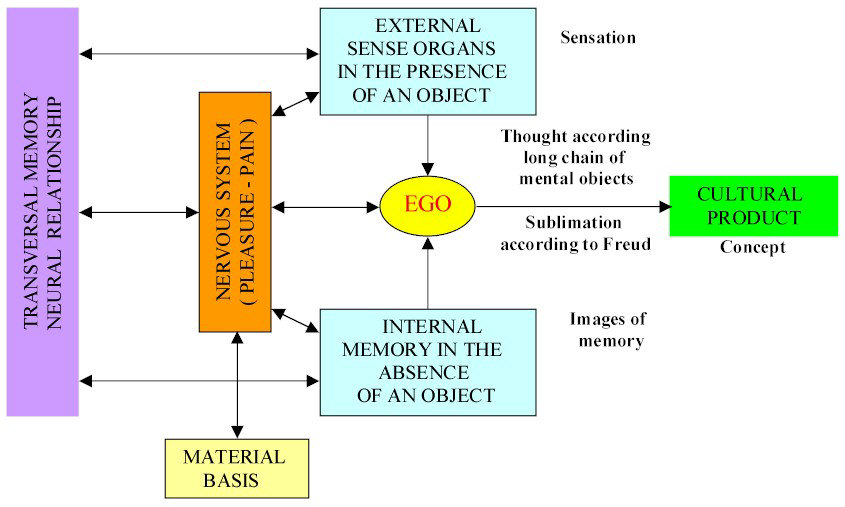REFERENCES
- Ref. 1 - Lecture for the Third European Day of Studies on "Functional
Culture and Permanent Education", on the tenth
-
anniversary of re-formation of the Popular University of Biella, ('Critical consciousness
and mass culture') by
- R.
Bertagnolio, 1986.
Ref. 2 - Roberto Ettore Bertagnolio, Prolegomena to a historic dialectic
psychoepistemology, (typed study).
Ref. 3 - Jean-Pierre Changeux, L’homme neuronal, 1983, Librairie
Arthème Fayard. Italian edition: L’uomo neuronale,
Campi
del sapere, Feltrinelli, Milano, 1983.
Ref. 4 - Antonio R. Damasio, Descartes’ Error. Emotion, Reason and
the Human Brain. Italian edition: L’errore di
Cartesio,
Adelphi, Milano, 1995.
Ref. 5 - Appendice VIII Università Popolare di Biella, Ieri e oggi, a
cura di Rabaglio e Zamprotta, Ed. Giovannacci 1986,
Biella.


| I
wuold like to develop some Freudian items in a neuroscientific perspective
according to Jean-Pierre Changeux's schemes |
- Schematic representation of the Freudian mechanism of the concept of
"Sublimation", which I have adopted essentially with a COGNITIVE meaning,
constantly keeping into consideration the superstructural process developed by DIALECTIC
HISTORIC MATERIALISM.
- This element is suitable to formulate some epistemology capable to explain the links
between the brain, the whole nervous system and the material basis where the entire BODY
lies.
- The neurologic element, with transversal features and values, is the memory,which
establishes the logic NEURAL RELATIONSHIP between images in the presence of an object and
images without an object, by superimposing some neurologic schemes of the Freudian concept
of "consciousness".
- All that can be shown in the following
scheme:
SCHEME N° 1

- I believe that pleasure and pain are the essential regulators of the final chain of
mental objects from which thought derives first, the cultural product next.
- The structure on which the entire individual rests is the conditioning fundamental
element and, as a consequence, his cognitive limit.

|
National Congress of Pavia, in the range of celebrations for the centennial
anniversary of Darwin's death. |
APPENDIX VIII
![]()
![]()

